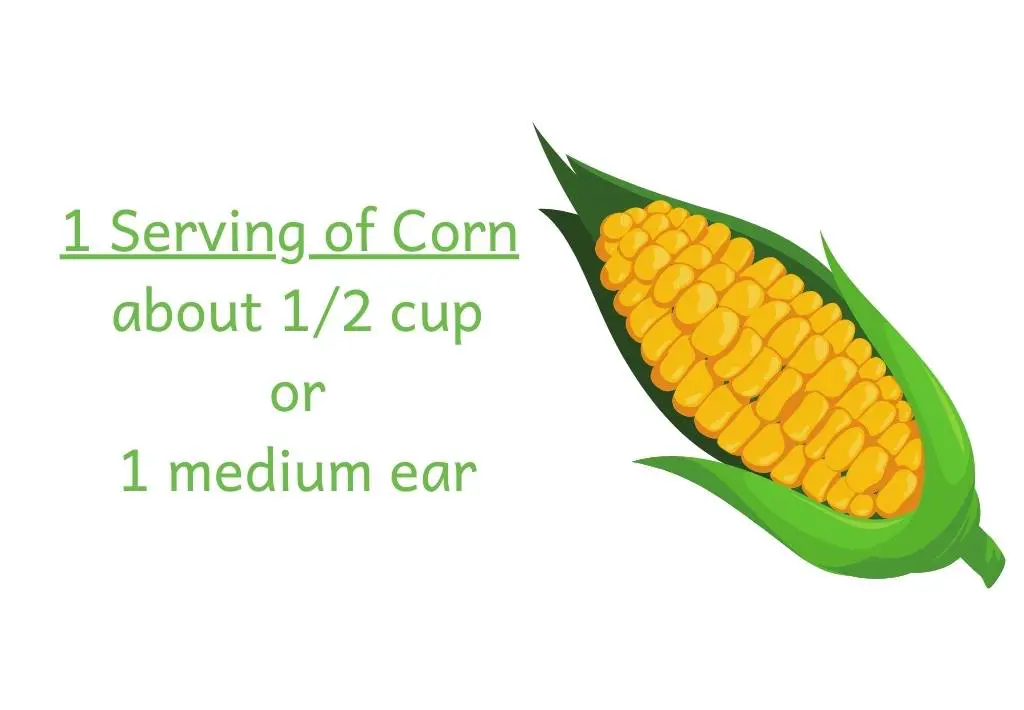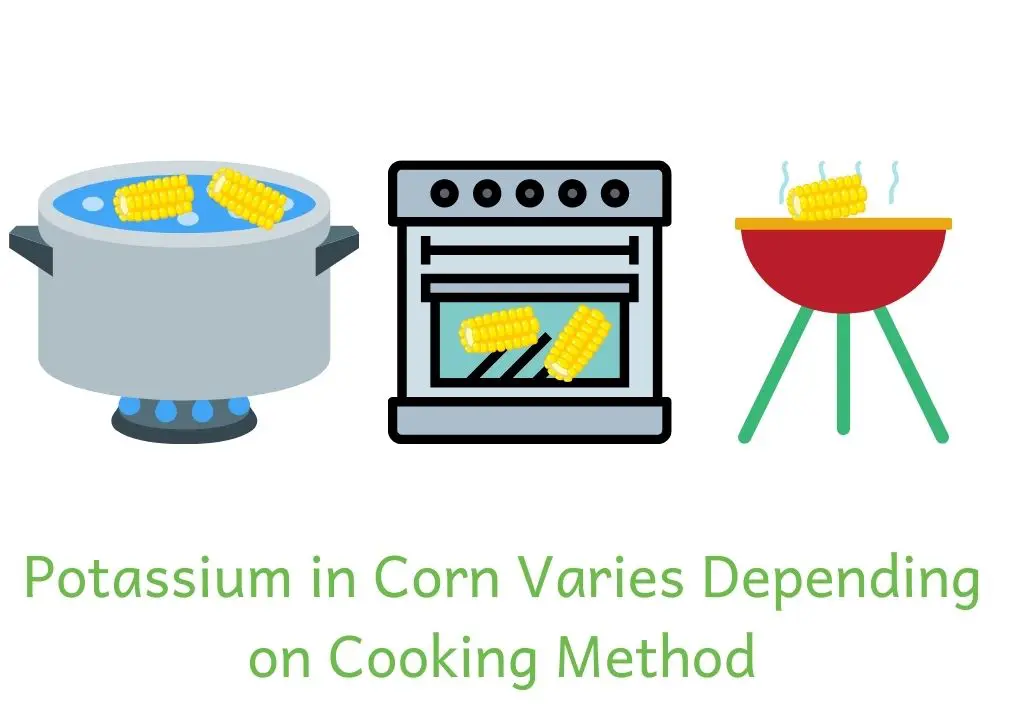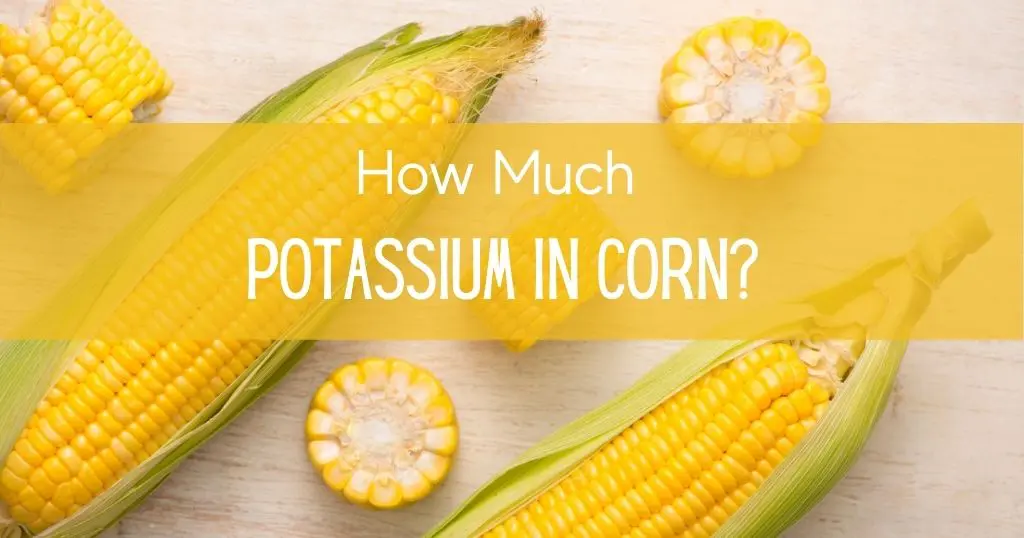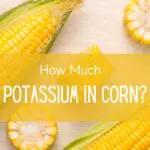What is better than an ear of freshly picked sweet corn? My mid-Michigan roots may make be biased, but corn on the cob is one of my favorite summer foods! But, is corn healthy? Is corn okay to eat if you have kidney disease or high potassium? Read on to understand everything you need to know about potassium in corn.
Table of Contents
Health Benefits of Corn
Before we jump into the nitty gritty, lets talk about the health benefits of corn!
Counts as a Veggie!
The first benefit of corn is simply that it is a vegetable! Yep! Corn might have a bad reputation because it is higher in starch than other veggies, but it absolutely counts as a vegetable and can help you meet your goal of 5 servings of vegetables per day.
If you have diabetes, or are concerned about your blood sugar, just make sure to count corn as part of your carbohydrate for that meal. Remember, your goal to control blood sugar is not to completely avoid carbohydrate. Instead, you just need to eat foods higher in carbohydrate, like corn, in healthy portions!

Fiber
Corn is a great source of fiber! A 1/2 cup of corn packs 3 grams of fiber. This is just as much as a slice of whole grain bread!
Natural Sweetness
Lastly, corn is delicious! Corn has a wonderful sweet flavor that is impossible not to love. Using corn, or other sweet veggies like carrots, to add just a touch of sweetness can cut down how much sugar or salt you need to make a tasty dish!
Potassium in Corn
And, the highlight of this post, the potassium in corn is a benefit for many people! A high potassium diet can help control blood pressure.
How Much Potassium Should I Eat?
Why should you care about potassium in corn? Getting potassium right can be confusing. Let’s clear it up!
Potassium for General Health
Most people should be eating more potassium. In fact, 98% of people in the United States are not eating enough! High potassium diets can help control blood pressure and promote heart health. The general recommendation for potassium is 2,600mg for women and 3,400mg for men.(1) Corn is a great way to add extra potassium to your day!
Kidney Disease
However, some people might need to limit how much potassium they eat. People who have kidney disease are at risk of high potassium blood levels, a condition called hyperkalemia. If this is you, you may need to limit how much potassium you eat. A 2,000mg potassium diet is considered “low” in potassium. But, your dietitian might have different recommendations for you.
Remember, not everyone with kidney disease needs to limit potassium. Only people who have high potassium need to limit how much potassium they eat. Ask your doctor or dietitian how much potassium is right for you.
The Amount of Potassium in Corn
So, how much potassium is in corn? The answer depends on the type of corn and how you cooked it. Check out this table to compare potassium in corn.
| Corn | Serving Size | Potassium (mg) |
|---|---|---|
| Fresh Corn on the Cob (white or yellow) | 1 medium ear | 368 |
| Boiled Fresh Corn on the Cob (white or yellow) | 1 medium ear | 158 |
| Canned Corn | 1/2 cup cooked | 109 |
| Frozen Corn | 1/2 cup cooked | 192 |
| Popcorn | 3 cups popped kernels | 180 |
| Cornmeal, de-germed | 1/4 cup | 56 |
| Cornmeal, whole wheat | 1/4 cup | 88 |
| Hominy | 1/2 cup | 8 |
Cooking Methods & Potassium in Corn
How corn is cooked has a big impact on how much potassium ends up in your body! Boiling corn (or any food!) tends to pull lots of vitamins and minerals from the food. Potassium included!

Boiled Corn
Generally, boiling food reduces potassium by half. Notice that 1 ear of fresh corn on the cob has about 60% more potassium in it compared to boiled corn on the cob. Because most people boil corn on the cob before eating it, that extra potassium in the “fresh” corn on the cob doesn’t make it into our bodies.
Any cooking method that utilizes water will reduce the amount of potassium and other water soluble nutrients in the food. Steaming will reduce nutrients a small amount, but not as much as boiling. Braising and pressure cooking also cause a loss of water soluble nutrients.
“Dry” cooking methods like baking, roasting or grilling, will not reduce potassium significantly.
Canned Corn
For a similar reason, canned corn tends to be lower in potassium than fresh or frozen. Canned corn is stored in liquid, which pulls some potassium out.
Be mindful of sodium in canned corn for a kidney friendly diet. Look for “low sodium” or “no salt added” canned options. Or, try frozen corn!
Healthy Corn Recipes
Here are some of my favorite healthy recipes that feature corn.
Lower Potassium Corn Recipes
- Farro & Corn Salad from The Food Network
- Garlic Parmesan Fried Corn
- Basil, Chive, Cucumber & Corn Salad
- Healthy Corn Fritters
Higher Potassium Corn Recipes
Happy Eating!
Melanie



I’m on hemodialysis 3x/wk. I love nuts and just wondering if corn nuts are safe to eat? Is it better than pecans, almonds?
Hi Kumar! The best foods and food patterns that are best for you are completely different for each person and depends on your labs. Ask your dietitian who is familiar with your medical history what is best for you!
The cornsilk is a known remedy for men with prostate swelling and will reduce the inflammation and give relief. Also high doses of Vitamin c will cleanse and eliminate inflammation.
I’m not aware of any research that cornsilk can help with prostate health. High doses of vitamin C can actually be harmful to some kidney patients, especially those with kidney stones. Nothing can completely eliminate inflammation – in fact, this would be a bad thing! Acute inflammation is an important part of immunity and how our body heals itself.
Hyacinth
September 2021, 1:58 pm
I found just a little blood in my urine and consulted the Doctor. I was told that I was not drinking enough water. I began drinking more and the situation was rectified. I was suddenly drawn to eating corn on the cob. Then I was led to check on line because I remember hearing that Corn Silk is good for the Kidneys. I though if corn silk is good then perhaps Corn on the cob is also good. Your blog brought clarity. I do boil the corn on the cob because grilling etc. makes it too hard and I do have a bit
of a digestive track disorder which means that I have to chew my food very well.
I will be happy if you could clarify the difference between the Corn Silk and the corn on the cob please.
Hello! I’m so glad you found my article helpful! There isn’t good research to suggest corn silk supplements are good for kidneys, therefore I cannot recommend it.
Hi, thanks for the tip on boiling corn on the cob. I’m happy to hear because I have to limit potassium because of CKD. Question: how long must I boil the corn to reduce the sodium 50%?
Corn actually doesn’t have much sodium in it!
Hello Melanie, thanks for your useful information. I am a ckd patient and an looking for the right kidney friendly diet. I just came across your blog. Can u offer any help? I wil be glad to hear from you.
Hi Felix! A healthy diet for kidney disease is very different for everyone – based on your labs and stage of kidney disease. This article will help you figure out where to start! If you want more individual help, I have a list of renal dietitians who work with patients individually on my resources page!
Hello I was diagnosed with CKD about 2 months ago I’m only 53 years old . It was really hard because I did not have symptoms. Even to this point my nephrologist I don’t know what happened to your kidney because all my blood chem results he said that I’m a healthy woman. Good bp, good cholesterol, great A1C 4.2 no infection or bacteria found in my blood but my GFR is 25 and creatinine is2.58 BUM is 42 . Now I’m on no salt diet and strictly veggies and fruits. Thank you for your information it helps a lot . God bless you…….
Hi Maria! Thank you for your comment and I am so glad you’ve found my site helpful. If you haven’t already, this is a really good article to start to understand what a kidney friendly diet looks like for you!
Have you considered getting a mycotoxin test? My ckd too came out of “nowhere”. In actuality, it just reached critical mass undetected.
Thank you so much for the information you give us, free of charge. I look forward to it. My husband, age 83, has CKD and a GFR of 11, and he’s been there in the 11 to 13 range for a couple of years or more. He has remained off dialysis, thus far. He was originally diagnosed about 17 years ago, at Stage 3, so I’ve studied and researched his diet on my own for that time. Your information is so thorough and easy to understand, and I always learn something. I just want to thank you.
Hi Mary Jane! Oh my goodness! Thank you SO very much for your kind words – these comments truly make my day and keep me motivated to keep going! GOOD for you for researching quality diet information yourself and slowing your husband’s disease progression. That is no easy task. Thanks again and I hope you continue to find my site useful!
As a diabetic with a total left kidney removed has really been a challenge. My early life was roadside fresh vegetable stands on country roads in upstate New York. Friendly smiles, good conversation, and great selections of home-grown vegetables! Than with an anticipation to rush home to husk, and boil a big pot of water for cooking the corn! Dripping in butter, salt and pepper so, so delicious.
Fresh corn is not as available in the desert! Not road-side stands with leisure conversation. Even without the late Summer rituals to secure delicious corn, the grocery stores do offer piles of corn ears. Even though many cobs have been torn so the kernels can be inspected, it is possible to discover a few good ears.
Thank you for enduring my nostalgia around country corn. I do still enjoy a cob or two. Thank you for this extensive clarification of the effects of corn on the kidney. The information well defined and I am glad I may occasionally enjoy a cob. Certainly not “dripping” in butter. As a new Member, I look forward to exploring and expanding my currently strict approach.
Hi Jan! Thank you SO much for your comment! I do LOVE a fresh piece of corn on the cob – I imagine getting it fresh is much harder in the desert. However, I imagine that it is a bit warmer than the 2 degrees I’m dealing with right now 🙂 Pros and cons of every place I suppose. I’m glad you enjoyed the article. Please let us know if you have any questions as you dig into the site.